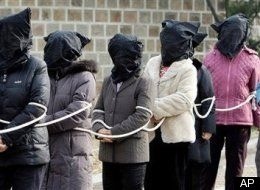North Korea’s leadership is committing systematic and appalling human rights abuses against its own citizens on a scale unparalleled in the modern world, including crimes against humanity, a United Nations report has concluded.
The UN’s commission of inquiry on human rights in North Korea, established by the UN Human Rights Council in March 2013 has been gathering evidence for almost a year. In an unprecedented series of public testimonies from more than 320 witnesses around the world, including former inmates of North Korea’s notorious political prison camps, the report details harrowing accounts of widespread torture, deliberate starvation, mass executions and arbitrary imprisonment.
Testimony given to the inquiry includes an account of a woman forced to drown her own baby, children imprisoned from birth and starved, and families tortured for watching a foreign soap opera.
“These are not mere excesses of the State,” the report read, “they are essential components of a political system that has moved far from the ideals on which it claims to be founded. The gravity, scale, and nature of these violations reveal a State that does not have any parallel in the contemporary world.”
“In the political prison camps of the Democratic People’s Republic of Korea, the inmate population has been gradually eliminated through deliberate starvations, forced labour, executions, torture, rape and the denial of reproductive rights enforced through punishment, forced abortion and infanticide,” the report said. However, up to 120,000 people are estimated to still be detained in prison camps.
The report has likened the ‘unspeakable atrocities’ as being ‘strikingly similar’ to Nazi Germany and has called on the UN Security Council to refer the matter to the International Criminal Court (ICC). The chair of the three person commission, Michael Kirby has written a personal letter to warn North Korea’s leader, Kim Jong-Un that he could face trial at the ICC for his personal culpability as head of state and leader of the military.
North Korea, who refused to participate in the investigation or give permission for the commission to visit the country, has unsurprisingly rejected the findings. In a statement sent to Reuters, North Korea called the findings ‘a product of politicisation of human rights on the part of the EU and Japan, in alliance with US hostile policy’. It reiterated that it had no charges to answer and that it would ‘strongly respond’ to any attempt to bring about regime change in the country.
After years of flouting international pressure over its nuclear programme, it is unclear what impact, if any, the UN report will have on North Korea’s leadership and what the international response will be. The recommendation of the report to refer the situation in North Korea to the ICC is neither helpful nor likely to be successful. While North Korea is not a signatory to the treaty that created the ICC, the UN Security Council can extend the court’s remit in exceptional cases. The Security Council will have to unanimously approve the request for any action at the ICC. That may be unlikely as China and Russia, two of five veto-wielding members, have consistently blocked punitive moves against North Korea’s human rights record.
China is widely seen as having more leverage over North Korea than any other country, not least because it is a vital source of resources. China supplies its neighbour with virtually all of its fuel needs and some 80 per cent of all its imports. Despite its considerable influence over North Korea, a change in China’s attitude is hardly likely to be forthcoming if its response to the UN report is to serve as an indication. It dismissed the UN’s criticism of its policy of forcibly repatriating North Koreans despite widespread evidence that they face mistreatment and detention on their return and it further rejected the findings of the report.
According to Reuters, the Chinese Foreign Ministry spokeswoman Hua Chunying stated: “Of course we cannot accept this unreasonable criticism. We believe that politicising human rights issues is not conducive towards improving a country’s human rights. We believe that taking human rights issues to the International Criminal Court is not helpful to improving a country’s human rights situation.”
There is little prospect for change with internal discontent in North Korea itself. There is no way for people to organise as there is no institution other than the leadership and freedom of thought, expression and belief is almost non-existent. State surveillance permeates every aspect of the lives of its citizens and any perceived ‘anti-State activities or expressions of dissent’ are harshly punished. In addition, the regime operates an indoctrination campaign that takes root from childhood which propagates an official personality cult and helps manufacture total obedience to its supreme leader.
The UN report on North Korea will be officially presented to the UN Human Rights Council in March 2014 where proposals on what action to take will be further debated and discussed. It is highly improbable that an ICC investigation would make it through the UN Security Council, and even if it did it is difficult to see Kim Jong-Un being tried. The UN report succeeds in bringing to the attention of the international community the sheer scale of brutality and appalling human rights abuses in North Korea for the first time. However, the report confirms what many had already suspected and in the absence of support from China it is difficult not to be sceptical about what meaningful change will occur in North Korea.
By Foridha Yasmin

